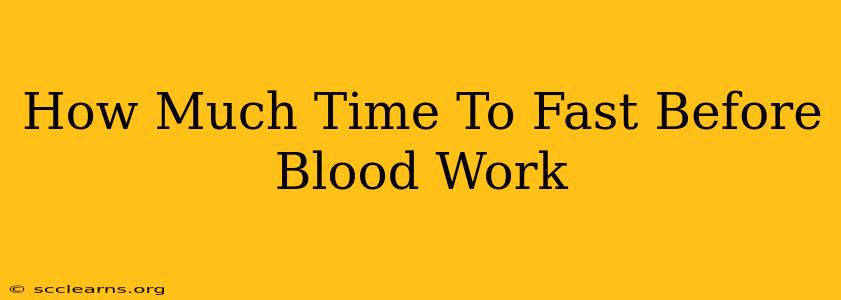Getting your blood work done is a crucial part of maintaining your health. But did you know that what you eat (or don't eat) before your test can significantly impact the results? Understanding how long to fast before blood work is essential for accurate and reliable results. This guide will clear up any confusion about fasting and its importance in blood tests.
Why is Fasting Important Before Blood Work?
Many blood tests require fasting because food intake can alter the levels of various substances in your blood. For example, eating can:
- Increase glucose levels: This is particularly important for tests assessing glucose metabolism, such as fasting blood sugar (FBS) tests and HbA1c tests. Elevated glucose levels due to recent food consumption can mask underlying conditions like diabetes.
- Affect lipid levels: Triglycerides, cholesterol, and other fats in your blood are influenced by recent food intake. A non-fasting sample might give inaccurate readings regarding lipid profiles, affecting the diagnosis of conditions like high cholesterol.
- Interfere with other analytes: Several other substances in your blood can be impacted by food intake, leading to potentially misleading results for a range of tests.
In short: Fasting ensures that your blood sample accurately reflects your body's baseline state, enabling your doctor to make informed decisions about your health.
How Long Should You Fast?
The standard fasting period before most blood tests is 8-12 hours. This allows your body enough time to metabolize the food you've consumed. However, some tests may require different fasting periods, or no fasting at all. Always check with your doctor or the laboratory to confirm the specific instructions for your particular blood tests.
What Constitutes Fasting?
Fasting isn't just about avoiding solid food. It also means restricting:
- All food and beverages (except water): This includes juices, soda, tea, coffee (even black coffee), and other drinks containing calories. Water is the only permitted beverage.
- Chewing gum: Even sugar-free gum can affect your test results.
- Smoking: Smoking can also affect your blood test results.
What if I Accidentally Break My Fast?
If you accidentally consume something during your fasting period, it's important to inform your doctor or the laboratory. They can advise you on the best course of action, which might involve rescheduling your blood test. Minor infractions might not significantly alter the results, but it's always best to be transparent.
Preparing for Your Blood Test: A Checklist
To ensure accurate results and a smooth process:
- Confirm fasting requirements: Contact your doctor's office or the lab to clarify the specific fasting instructions for your tests.
- Plan your schedule: Schedule your blood draw for a time that's convenient and allows for a comfortable fasting period.
- Drink plenty of water: Staying hydrated is crucial, especially during the fasting period.
- Follow instructions carefully: Adhere strictly to the guidelines provided to avoid compromising the accuracy of your results.
- Communicate any concerns: If you have any questions or concerns, don't hesitate to contact your doctor or the laboratory.
By understanding and following fasting guidelines carefully, you can contribute to the accuracy of your blood test results, allowing your doctor to provide the best possible care. Accurate information is key to your health.

